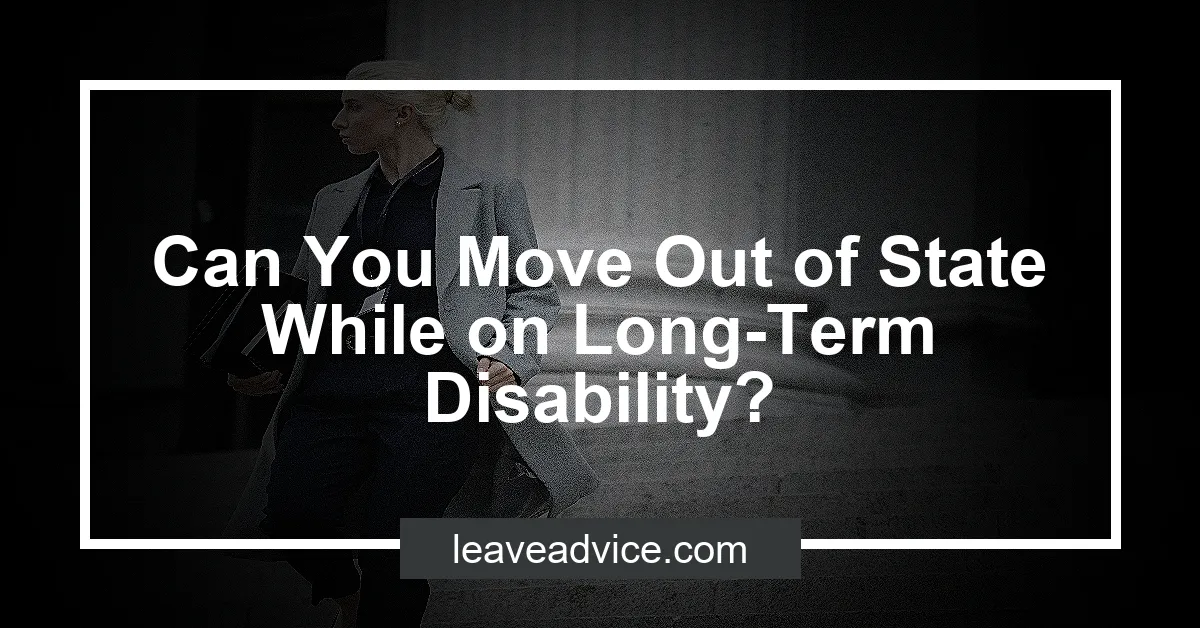Can You Move Out of State While on Long-Term Disability?
Factors to Consider Before Moving Out of State While on Long-Term Disability
While moving out of state may not affect your eligibility for Social Security Disability Insurance benefits, it can have an impact on other benefits you may be receiving. Before making the move, you should consider:
- The laws and regulations of the state you are moving to
- Whether or not your healthcare providers are available in the new state
- The cost of living and availability of affordable housing, especially if you are on a fixed income
- The impact of the move on your personal support system, including family and caregivers
Steps to Take to Ensure Your Benefits are Not Affected
If you have decided to move out of state while on long-term disability, here are some steps you can take to ensure your benefits are not affected:
- Notify the Social Security Administration of your change of address and provide them with your new contact information
- Notify your healthcare providers and insurance companies of your move and ensure that your coverage will continue in the new state
Factors to Consider
Policy Terms and Conditions
Can you move out of state while on long-term disability? The answer depends on the terms and conditions of your disability insurance policy.
It’s important to review the policy carefully and speak with your insurance provider to understand how your benefits will be affected if you move out of state. Some policies may restrict benefits, while others may allow it.
SSDI Eligibility Requirements and Benefits
If you are receiving Social Security Disability Insurance (SSDI) benefits, you can move to a different state without worrying about losing your eligibility or benefits. However, it’s crucial to update your address with the Social Security Administration within ten days of moving so that you continue to receive your benefits.
You can update your address online, by phone, or in person at your local Social Security office.
State-Specific Disability Benefits
If you receive disability benefits from your state, you need to check their eligibility criteria for out-of-state residents. Some states may continue to pay benefits if you move out of state, while others may not.
You need to contact your state disability benefits office or department to find out how moving out of state may affect your benefits.
Steps to Take When Moving Out of State
Consult with Your Legal Team
If you are receiving long-term disability benefits and considering moving out of state, it’s best to consult with your legal team to understand how the move may affect your benefits. The laws and regulations of long-term disability may vary depending on the state, and you may need to take necessary steps to ensure you are not jeopardizing your benefits.
Your legal team can advise you on how to proceed and can provide legal advice if necessary.
Notify Your Insurance Provider
After consulting your legal team, you must also notify your long-term disability insurance provider of your move and provide them with your new address. It’s essential to inform your insurance provider at least 30 to 60 days before your move, so they have enough time to process your claim and determine how the move may impact your benefits.
Your insurance provider can advise you on any necessary steps you need to take before moving and can provide you with the information about the changes in the benefits structure.
Inform Social Security Administration
If you are receiving Social Security Disability Insurance benefits (SSDI), you must inform the Social Security Administration (SSA) of your change in address within ten days of moving. You can provide the information online, by phone, or by visiting a local SSA office.
Failing to update your address can result in suspended or delayed benefits. Updating your address is necessary to get your disability payments to the correct address and keep receiving your benefits without any issues.
Check Your State Disability Benefits Eligibility Criteria
If you are receiving disability benefits from your state, you need to check their eligibility criteria for out-of-state residents. Some states may continue to pay benefits if you move out of state, while others may not.
It’s best to check with your state disability benefits office or department for more information. Your legal team can also provide you with this information and advise you on any necessary steps to take to continue receiving your state disability benefits.
Can You Move Out of State While on Long-Term Disability?
If you are on long-term disability, you may be wondering if you can move to a different state. Yes, you can move out of state while on long-term disability, but it can affect your benefits in some cases.
It’s recommended that you consult with your legal team to understand the potential impact of moving on your benefits.
Steps to Take Before Moving Out of State
Before you move out of state while on long-term disability, it’s essential to take the following steps:
- Understand your policy terms and how moving can impact them
- Notify your insurance provider about your move and provide them with your new address
- Notify the Social Security Administration (SSA) about your move and your new address
- Check your state disability benefits eligibility criteria in your new state
- Consult with your legal team to ensure that your benefits are not affected by the move

